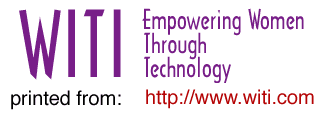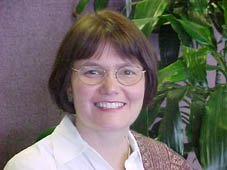
Dr. Leslie Butterfield, originally from Connecticut, has over twelve years of experience in the business-to-business software industry. She was most recently vice president of marketing for PowerBrief, Inc., a privately held ASP software developer for the legal industry. Dr. Butterfield was responsible for product strategy, marketing communications, brand management, and media and investor relations.
She joined PowerBrief in April, 2000 from BMC Software (Nasdaq: BMCS) where she was corporate web strategist. BMC Software, a Forbes 500 and S&P 500 company with revenues of over $1.5 billion, is a leading provider of systems management solutions. Dr. Butterfield joined BMC Software in 1994 as product marketing manager responsible for more than 100 products and later became senior manager of marketing operations until she joined the E-business team where she was responsible for internal and external web strategy.
Prior to joining BMC Software, she was worldwide marketing manager for Welcom Software and VP of marketing and sales for Texim Inc., both project management software vendors. As a founder of Texim Dr. Butterfield grew the company and successfully negotiated its acquisition in 1992 by Welcom. Butterfield holds a Ph.D. in communications and an master's in design theory from the University of Minnesota.
1. What was your first job in technology?
2. Who has been your most significant mentor? Why?
3. What has been your greatest challenge and what strategies did you use to overcome obstacles?
4. Who has been the most influential person in your life? Why?
5. What lessons have you learned that would be valuable to women beginning their careers in technology?
6. What new technology do you believe will have the most positive impact on the world in the next 20 years? The most negative impact?
On a lighter note:
2. What was the last book you read? What books do you love to recommend?
I read fiction for pleasure and while I also read management books, my regular business reading is done in periodicals such as Fast Company, Forbes, Inc. and Time.
3. If you couldn't do what you are doing now, what profession would you choose?
4. What is your definition of success?
 Leslie Butterfield
Leslie Butterfield
As a graduate student at the University of Minnesota in 1988, I had the opportunity to work on a research project that was a joint venture between the U of M and the 3M Corporation. Our goal was to create a software program to produce custom-fitted clothing. After several years of research and development, we sold the product to Levi Strauss who used it to produce custom jeans. At a very early stage of my career, this opportunity exposed me to software development, business development, product strategy and most importantly, teamwork in a business environment.
I have many mentors and tend to talk to different people about different issues. One woman has been a constant in my life since I was a girl. Nell Hillsley is a spiritual, creative and powerful woman from whom I find inspiration to make good choices, to help others along the way and to believe that there is a great purpose for my life that I am responsible to discover and fulfill.
Several times I ran into glass ceilings at companies where I worked. My method for breaking through has been to change companies or at least departments. In my experience, the ceiling is built of fear and a lack of understanding of my skill set. People tend to box others into past roles and find it easier to give the promotion to someone new or in some cases, someone who is a friend and typically of the same gender. As long as men dominate the top jobs, they will also tend to dominate the next level. I find it helps to start anew in my major career moves.
When I was 30, my mother returned to college to study textile conservation, which is a very technical field albeit unrelated to computers. Upon graduating, she had multiple prestigious job offers even though she was past 50 and wondered if anyone would hire someone with so little time left for a career. She taught me to believe in my strengths and to set my goals high regardless of what others might consider a "normal" path. Although she died of cancer six years ago, what she taught me guides me daily.
Even if you do not want to create technology or work in a technical role, there are wonderful roles in the technology field for communicators, business people, and those seeking a dynamic and exciting career. It's important to get your credentials up front and to open doors through internships and networking. Learn everything possible about the various jobs in technology companies so you can prepare for the best available job. Join some professional organizations as early as possible to meet people and to learn about their fields.
Interestingly, the answer to these questions is probably the same one. We are learning that the technology that enables growth also keeps us from doing other things and causes a large gap between those who have it and those who do not. I believe mobile technology is the next big thrust and will focus on communication and information management. We will have access to almost any information we need from a hand held device that is relatively inexpensive and reasonably easy to use. This will include technology to integrate generic information such as maps, medical and legal data with private information such as contacts, medical records and personal history. With the integration comes knowledge management and data mining at a personal level so you can quickly find people, places and solutions to complex questions.
1. If you could have dinner with any 2 people (living or not), who would they be?
I would enjoy dinner at the White House with Eleanor Roosevelt and my grandmother Lida Butterfield who were contemporaries and both forward-thinking women of great strength. It would be a thrill to listen to their conversation and to find out what they would think of my life in the 21st century.
I just finished "Memoirs of a Geisha" by Arthur S. Golden. I enjoyed learning about the women of Japan who lived as mistresses of powerful men and I was impressed by the perspectives of the main character who was increasingly aware of her situation and of the world outside her own.
I've already had three professions: fiber artist, professor and high-tech exec. That doesn't include mother, wife and volunteer. If I could start over, I would be a medical doctor, probably an Oncologist.
Success is about balance. To me it means improving the state of things for others balanced with doing things that bring me professional and personal growth. On a personal level, this balance is between pushing my boundaries of comfort so I learn as much as possible while maintaining a healthy lifestyle with diverse involvements.
|
For more 'WITI Women' articles, go to: http://www.witi.com/wire/witiwomen/ For all the latest news and information on women in technology, visit http://www.witi.com
All rights reserved. |